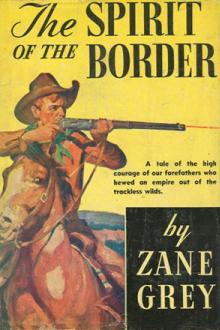The U. P. Trail, Zane Grey [robert munsch read aloud .txt] 📗

- Author: Zane Grey
Book online «The U. P. Trail, Zane Grey [robert munsch read aloud .txt] 📗». Author Zane Grey
Life indoors that night in Benton was monstrous, wonderful, and hideous.
Every saloon was packed, and every dive and room filled with a hoarse, violent mob of furious men: furious with mirth, furious with drink, furious with wildness—insane and lecherous, spilling gold and blood.
The gold that did not flow over the bars went into the greedy hands of the cold, swift gamblers or into the clutching fingers of wild-eyed women. The big gambling-hell had extra lights, extra attendants, extra tables; and there round the great glittering mirror-blazing bar struggled and laughed and shouted a drink-sodden mass of humanity. And all through the rest of the big room groups and knots of men stood and sat around the tables, intent, absorbed, obsessed, listening with strained ears, watching with wild eyes, reaching with shaking hands—only to gasp and throw down their cards and push rolls of gold toward cold-faced gamblers, with a muttered curse. This was the night of golden harvest for the black-garbed, steel-nerved, cold-eyed card-sharps. They knew the brevity of time, and of hour, and of life.
In the dancing-halls there was a maddening whirl, an immense and incredible hilarity, a wild fling of unleashed, burly men, an honest drunken spree. But there was also the hideous, red-eyed drunkenness that did not spring from drink; the unveiled passion, the brazen lure, the raw, corrupt, and terrible presence of bad women in absolute license at a wild and baneful hour.
That was the last pay-day Beauty Stanton’s dancing-hall ever saw. Likewise it was to be the last she would ever see. In the madness of that night there was written finality—the end. Benton had reached its greatest, wildest, blackest, vilest. But not its deadliest! That must come—later—as an aftermath. But the height or the depth was reached.
The scene at midnight was unreal, livid, medieval. Dance of cannibals, dance of sun-worshipers, dance of Apaches on the war-path, dance of cliff-dwellers wild over the massacre of a dreaded foe—only these orgies might have been comparable to that whirl of gold and lust in Beauty Stanton’s parlors.
Benton seemed breathing hard, laboring under its load of evil, dancing toward its close.
Night wore on and the hour of dawn approached. The lamps were dead; the tents were dark; the music was stilled; and the low, soft roar was but a hollow mockery of its earlier strength.
Like specters men staggered slowly and wanderingly through the gray streets. Gray ghosts! All was gray. A vacant laugh pealed out and a strident curse, and then again the low murmur prevailed. Benton was going to rest. Weary, drunken, spent nature sought oblivion—on disordered beds, on hard floors, and in dusty corners. An immense and hovering shadow held the tents and halls and streets. Through this opaque gloom the silent and the mumbling revelers reeled along. Louder voices broke the spell only for an instant. Death lay in the middle of the main street, in the dust—and no passing man halted. It lay as well down the side streets in sandy ditches, and on tent floors, and behind the bar of the gambling-hell, and in a corner of Beauty Stanton’s parlor. Likewise death had his counterpart in hundreds of prostrate men, who lay in drunken stupor, asleep, insensible to the dust in their faces. No one answered the low moans of the man who, stabbed and robbed, had crawled so far and could crawl no farther.
But the dawn would not stay back in order to hide Benton’s hideousness. The gray lifted out of the streets, the shadows lightened, the east kindled, and the sweet, soft freshness of a desert dawn came in on the gentle breeze.
And when the sun arose, splendid and golden, with its promise and beauty, it shone upon a ghastly, silent, motionless sleeping Benton.
22
To Allie Lee, again a prisoner in the clutches of Durade, the days in Benton had been mysterious, the nights dreadful. In fear and trembling she listened with throbbing ears to footsteps and low voices, ceaseless, as of a passing army, and a strange, muffled roar, rising and swelling and dying.
Durade’s caravan had entered Benton in the dark. Allie had gotten an impression of wind and dust, lights and many noisy hurried men, and a crowded jumble of tents. She had lived in the back room of a canvas house. A door opened out into a little yard, fenced high with many planks, over or through which she could not see. Here she had been allowed to walk. She had seen Durade once, the morning after Fresno and his gang had brought her to Benton, when he had said that meals would be sent her, and that she must stay there until he had secured better quarters. He threatened to kill her if he caught her in another attempt to escape. Allie might have scaled the high fence, but she was more afraid of the unknown peril outside than she was of him.
She listened to the mysterious life of Benton, wondering and fearful; and through the hours there came to her the nameless certainty of something tremendous and terrible that was to happen to her. But spirit and hope were unquenchable. Not prayer nor reason nor ignorance was the source of her sustained and inexplicable courage. A star shone over her destiny or a good angel hovered near. She sensed in a vague and perplexing way that she must be the center of a mysterious cycle of events. The hours were fraught with strain and suspense, yet they passed fleetingly. A glorious and saving moment was coming—a meeting that would be as terrible as sweet. Benton held her lover Neale and her friend Larry. They were searching for her. She felt their nearness. It was that which kept her alive. She knew the truth with her heart. And while she thrilled at the sound of every step, she also shuddered, for there was Durade with his desperadoes. Blood would be spilled. Somewhere, somehow, that meeting would come. Neale would rush to her. And the cowboy! ... Allie remembered the red blaze of his face, the singular, piercing blue of his eye, his cool, easy, careless air, his drawling speech—and underneath all his lazy gentleness a deadliness of blood and iron.
So Allie Lee listened to all sounds, particularly to all footsteps, waiting for that one which was to make her heart stand still.
Some one had entered the room adjoining hers and was now fumbling at the rude door which had always been barred from the other side. It opened. Stitt, the mute who attended and guarded her, appeared, carrying bundles. Entering, he deposited these upon Allie’s bed. Then he made signs for her





Comments (0)